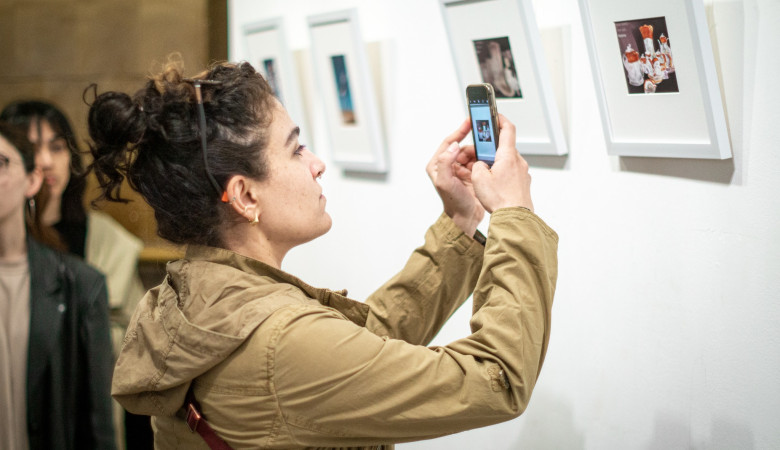The 2023 School of the Complex Past, part of the annual alternative school of CSN Lab, addressed the ongoing impacts of colonialism and neo-colonialism on cultural and social life. The program featured a range of initiatives, including an intensive dialogue program, a winter school, the "Postcards from the Complex Past" exhibition, and the "Decolonization Dictionary" campaign. Through these activities, the project fostered critical discussions and raised awareness about the deep-rooted effects and repercussions of the colonial past on Armenian society.
The colonial past continues to be unknown and undiscussed by the general public. On one hand, the absence of discussion on the impact of a complex past hinders our ability to perceive cause-and-effect relationships and have a comprehensive understanding of present-day reality, and on the other hand, it raises new concerns and problems. We frequently perceive (neo)colonialism solely as political and economic phenomena, discourses related to appropriation, subjugation and exploitation of resources. Nevertheless, the colonial past is deeply embedded in the cultural and social memory of the society. For decades, the language of the colonized past remains unexamined and unreflected, thereby serving as a foundation for internal colonization and/or self-colonization. Our understanding of the past is often shaped and perceived through the lens and prism of the foreigner. The perception of our own past is constructed through knowledge, archives, and images that were shaped to consider us as objects rather than active subjects, ultimately serving the purpose of cultural colonization. Unfortunately, it must be acknowledged that the exoticization and appropriation of our culture are not limited to the historical past but continue to pervade our present-day lives and cultural experiences.
Questions of a similar nature often lie beyond the scope of research interests for artists, cultural practitioners, as well as educational and other public institutions. Consequently, the absence of definitions, evaluations, and assessments makes it extremely challenging to attempt to comprehend the narratives of the past, present, and possible future. The urgency to establish a discourse on the colonial past has become even more severe in the context of the intensified wars and armed conflicts in the region in recent years.
The main objectives of the 2023 School of the Complex Past, the alternative educational program was to emphasize and promote a public discourse on colonization, expose the complex past and raise awareness about the challenges of neo-colonization, through specially designed four components of alternative learning.
Dialogue on (neo)colonialism (discussions)
The three-day dialogue program of the “School of Complex Past” was full of thematic lectures, thought-provoking questions, and engaging discussions. The participants had the opportunity to explore various subjects, including colonialism and cultural resistance, the influence of colonization on architecture and urban space, the role of feminist art in confronting colonialism, and the concept of internal colonialism. Based on the presented issues and knowledge, the participants had a dialogue from the perspectives of conflicting parties: both colonizers and the ones who were colonized. In this way, they not only reflected on the issues of the past but also tackled and addressed the challenges of the present.
Exploring the Colonial Past (Winter School)
The winter school gave an opportunity to the participants to engage in profound reflection on the complex past and colonization. The guest speakers covered a wide range of perspectives on colonialism, shedding light on its impact on culture, architecture, urban environments, language, literature, science, and education. The program also provided participants with a platform for engaging in extensive discussions with the invited lecturers, enabling them to develop a more comprehensive and nuanced understanding of colonization and neo-colonization.
Portraying a complex past (exhibition)
The "Postcards from a Complex Past'' exhibition was a platform created for contemporary Armenian artists, to reflect on the complex past through the format of postcards and convey the sensory understanding of colonization.
Postcards are a prevalent medium that contribute to the creation of colonial imagery and perception, as they subject space, time, bodies, and everyday practices to the stereotypical portrayal of colonial reality. They have a history of serving as conduits for propagating, replicating, and reinforcing colonial discourse. This is the reason why contemporary Armenian artists ventured into the realm of postcards and brought attention to the issues surrounding the colonial past and its present-day challenges. Through various perspectives such as a feminist lens, architectural and urban space critique, and media discourse analysis, they reframed and reinterpreted the complex past.
Decolonizing public spaces (informative campaign)
The "Decolonization Dictionary" informative campaign served as the culminating phase of the 2023 School of Complex Past. Through media publications and interventions in urban spaces, it aimed to shed light on the profound and often inconspicuous effects and consequences of (neo)colonialism, presenting them in a more accessible and comprehensible format for the general public. Every publication and poster, designed in Armenian and English, advocated the "Decolonize yourself” slogan, explored and presented the impacts of colonization on body, language, city, memory, and nature.
The 2023 School of Complex past came into realization with the help of our partners and colleagues in Prague Civil Society Center.


